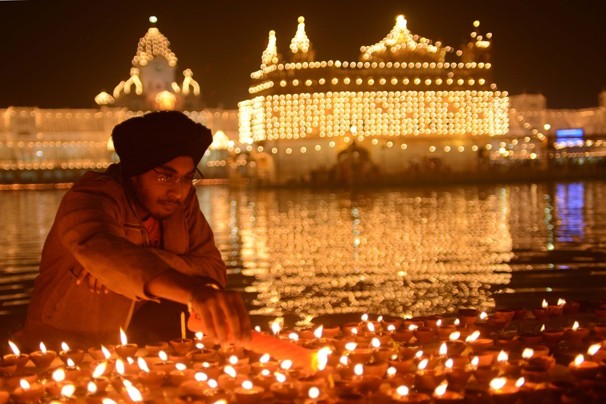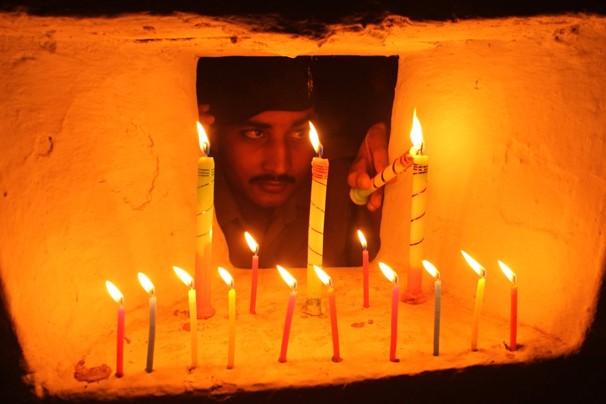
The Washington Post
Posted at 02:51 PM ET, 11/15/2012

An Indian Sikh devotee lights oil lamps at the Golden Temple in Amritsar on Nov. 13, 2012, on the ocassion of Bandi Chhor Divas or Diwali. Sikhs celebrate Bandi Chhor Divas or Diwali to mark the return of the Sixth Guru, Guru Hargobind Ji, who was freed from imprisonment and also managed to release 52 political prisoners at the same time from Gwalior fort by Mughal Emperor Jahangir in 1619. (AFP/GETTY IMAGES)
Last year, with President Obama and this year with Vice President Joe Biden, I had the privilege to celebrate the festival of Diwali at the White House. Similarly, over a billion Hindus, Jains and Sikhs all over the world, 2 million of them in America, and one, astronaut Sunita Williams, in outer space celebrated this auspicious holiday. It is a tribute to the greatness of America’s leaders that festivals of minority faiths are so well respected.
My family belongs to the Jain community, which has over 100,000 followers in North America and 6 million in India. On Diwali day in 527 B.C., Lord Mahavira, a Jain spiritual leader, achieved nirvana by adhering to three core principles: nonviolence, non-absolutism and non-materialism.
One week after reelection, I wondered what wisdom Eastern traditions would have to offer to the president and vice president as they embark on the next four years of leadership.
The founding principle of Jain religion is nonviolence or ahimsa. With civil war raging in Syria, nuclear threats from Iran and terrorist suicide attacks in Afghanistan, the president needs to have a steady hand in balancing diplomacy over military might. Also, he needs to utilize more entrepreneurs, educators and thinkers rather than troops to midwife the transition of countries from dictatorship to democracy. But there is another form of violence that is being ignored. It is violence by humans towards the environment. Our hydrocarbon use is leading to global warming and its impact is being seen in part by the destructive powers of hurricanes like Katrina and Sandy. The president needs to use his leadership and his role as recipient of the Nobel Peace Prize to more strongly address all kinds of violence. If he does, he has the opportunity to be among the greatest leaders of modern times, in the footsteps of Abraham Lincoln, Mahatma Gandhi and the Rev. Martin Luther King Jr. following the principle of nonviolence.
The second wisdom from Jainism is non-absolutism, which encourages us to be open-minded to the faiths, traditions and, yes, political views of others. While President Obama did win the electoral and the popular vote, he must remember that 59 million Americans voted against him. The Jain fable of six blind men and the elephant teaches us that no single person has the complete truth—rather truth only exists in our collective thinking. Just as President Obama was magnanimous in selecting his former Democratic Party primary rival Hillary Rodham Clinton to be his secretary of state, he may consider a role for Republican presidential nominee Mitt Romney or other Republicans for top administrative positions. With the demographic shift of large number of African Americans, Latinos and Asian Americans coming into the electorate, the president must also tap into these new voices as he shuffles his staffers and appointees.
The third wisdom Eastern religions offer is non-materialism. It may seem ironic that more spending by consumers leads to stronger economic growth, while Eastern principles teach us to be non-materialistic. I don’t see a conflict here. The principles tell us to use our resources efficiently and to share our wealth. Waste and greed for example, as it occurs in nearly 30 percent of health-care expenditures, hinders economic growth. With many European economies collapsing, with Chinese and Indian economies faltering, and with the American economy showing an anemic rebound, it is imperative to find innovative approaches to financial growth, compassionate budget cutting and employment opportunity for the poor. These fundamentals, rather than unbridled wealth and materialism for a few, need to guide our economic and budgetary decisions.
At the White House celebration, we enjoyed music, food and fun conversations. Yet, amid the festivities, it was important to remember the deep spiritual and philosophical message of nonviolence, non-absolutism and non-materialism that Diwali and Eastern religions offer to the citizens and the lead
Dr. Manoj Jain is an infectious disease physician in Memphis and a writer whose writings have appeared in The Washington Post and the Commercial Appeal and the New York Times.
 Dr. Manoj Jain
Dr. Manoj Jain
